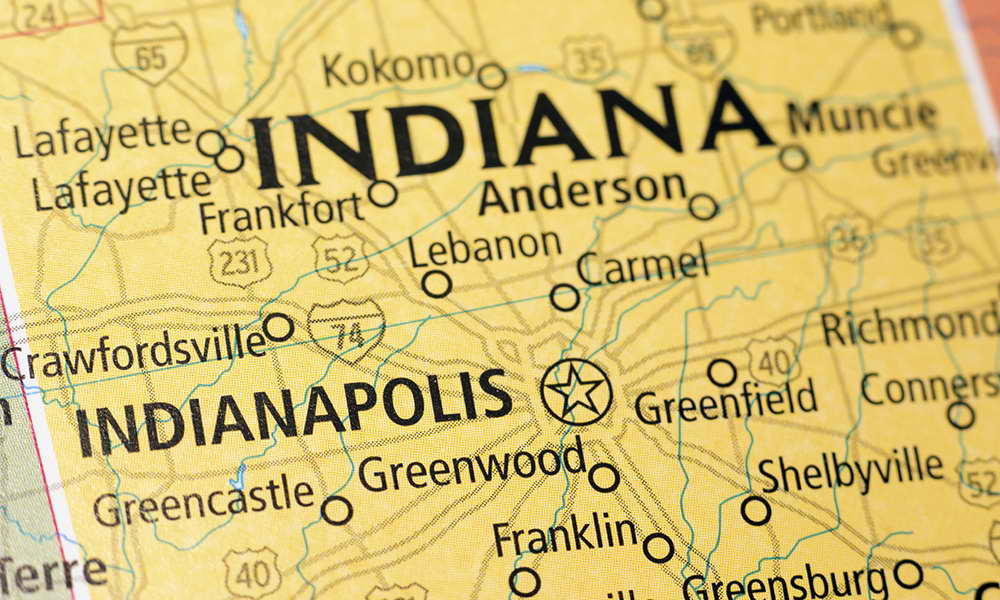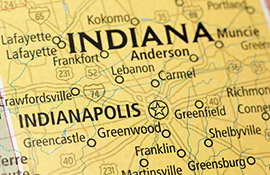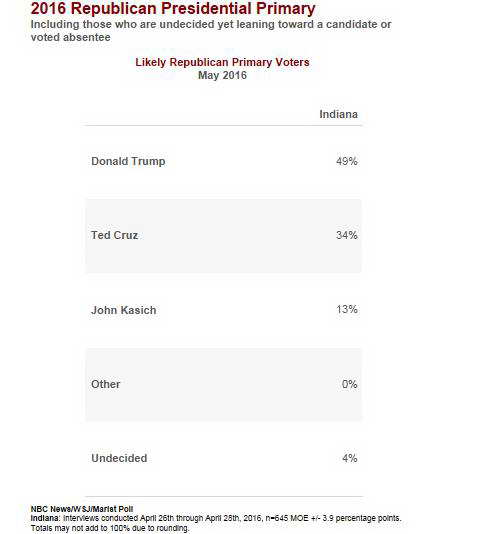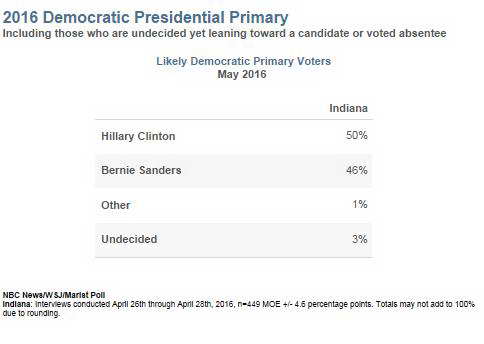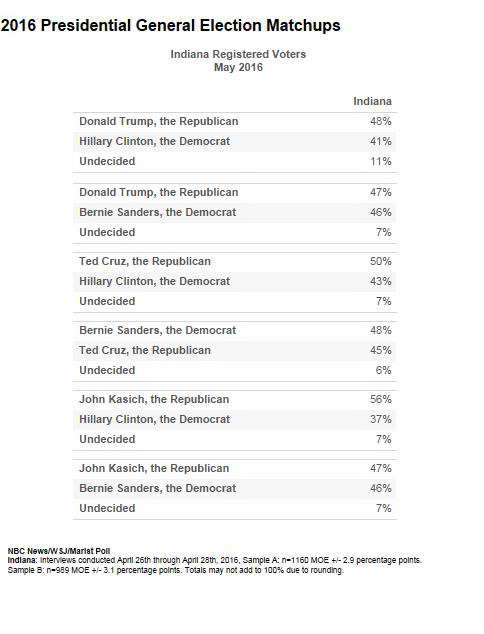May 1, 2016
5/1: In Indiana Trump Leads, Clinton and Sanders Close
NBC News/WSJ/Marist Poll
In the quest for the Republican nomination, businessman Donald Trump, 49%, is ahead of Texas Senator Ted Cruz, 34%, by 15 points among likely Republican primary voters in Indiana. Ohio Governor John Kasich trails far behind with 13%. Trump has the advantage among many key demographic groups. He especially outdistances his opponents among likely Republican primary voters who self-identify as moderate or conservative, those who are over 45, without a college education, or who are men. Cruz does best among likely Republican primary voters who describe themselves as very conservative.
59% of likely Republican primary voters with a candidate preference report they strongly support their choice of candidate. 66% of Trump’s backers compared with 56% of Cruz’s supporters and 40% of those for Kasich say they are firmly committed to their candidate selection.
When it comes to the second choice of likely Republican primary voters with a candidate preference, 39% select Kasich followed by Cruz, 31%, and Trump, 18%.
Last week, Cruz and Kasich announced they would team up to defeat Donald Trump in Indiana. However, 63% of likely Republican primary voters say the alliance is not a factor in deciding their vote, including 63% of Trump’s supporters, 66% of Cruz’s backers, and 53% of likely GOP voters for Kasich. 37% say it is a factor, including 22% who say it is a major factor and 15% who report it is a minor factor.
58% of likely Republican primary voters say they disapprove of the deal between Cruz and Kasich to stop Trump at all costs and think it is further proof that the Republicans are trying to rig the game against Trump. 34% of likely GOP voters approve of the coalition to stop Trump at all costs.
Should the Republicans face a contested convention this summer, nearly two-thirds of likely Republican voters in Indiana, 64%, say that the candidate with the most votes should be the GOP nominee even if he does not receive a majority of delegates before the convention. This includes 88% of likely Republican primary voters for Trump but also 42% of Cruz’s supporters and 29% of those who back Kasich. 29% of likely GOP voters believe if no one gets a majority, the delegates should select the person they think would be the best nominee, including 64% of Kasich’s supporters.
“After the Acela primary, there is an aura of inevitability surrounding the Trump and Clinton candidacies,” says Dr. Lee M. Miringoff, Director of The Marist College Institute for Public Opinion. “In Indiana, Trump is positioned to corral all the delegates which will be a big prize toward winning the nomination outright. Clinton and Sanders are more likely to divide the delegate pool which will do little to change the narrative on the Democratic side.”
Looking at the Democratic contest, former Secretary of State Hillary Clinton, 50%, and Vermont Senator Bernie Sanders, 46%, are closely matched among likely Democratic primary voters in Indiana. Clinton’s support is bolstered by likely Democratic primary voters who are 45 years of age or older among whom she receives 70%. Sanders’ support is buoyed by likely Democratic primary voters who are under 45 years old, among whom he is supported by 70%. He also does well among those who are first-time or independent voters. While Clinton, 57%, outpaces Sanders, 39%, among women, Sanders, 55%, leads Clinton, 41%, among men.
71% of likely Democratic primary voters in Indiana with a candidate preference say they strongly support their choice of candidate. 71% of Clinton’s supporters and 70% of Sanders’ backers express a firm level of commitment to their choice of candidate.
In hypothetical general election contests, all three Republican candidates lead Clinton. Sanders, however, is closely matched among registered voters statewide against Trump, Cruz, and Kasich.
A plurality of the Indiana electorate, 42%, considers Trump’s statements on the campaign trail to be frequently insulting and thinks that he has the wrong approach on many issues. Included here are 73% of Democrats but only 38% of independents and 20% of Republicans. 26% say Trump’s manner and language are bothersome, but he raises important issues, and 21% believe Trump tells it like it is and has the right approach on many issues. 10% percent do not think any of these statements describe Trump’s manner.
Turning to the Republican primary for U.S. Senate, Todd Young, 56%, outdistances Marlin Stutzman, 24%, among likely Republican primary voters in Indiana. A notable 19% are undecided.
42% of likely Republican primary voters with a candidate preference for U.S. Senate say they strongly support their choice of candidate. 49% of Stutzman’s supporters, compared with 39% of Young’s backers, say they will not waver in their commitment to their candidate.
Indiana residents divide about the job performance of Governor Mike Pence. 42% of adults statewide, including 63% of likely Republican primary voters, approve of the job he is doing in office while 41% disapprove. A notable 17% are unsure.
Looking at President Barack Obama’s approval rating in the Hoosier State, 42% of adults statewide, including 84% of likely Democratic primary voters, approve of the president’s performance. 50% disapprove.
Complete May 1, 2016 NBC News/Wall Street Journal/Marist Poll Release of Indiana

